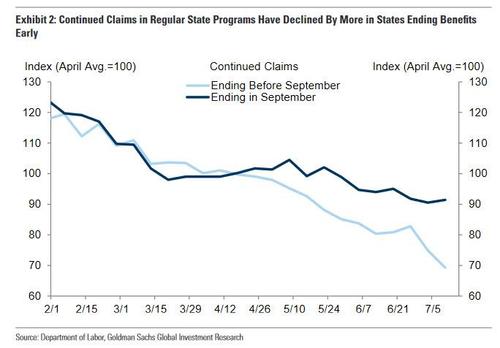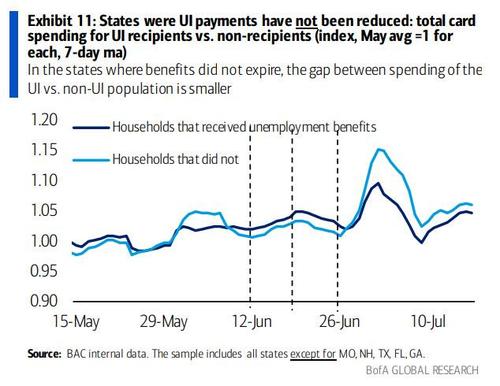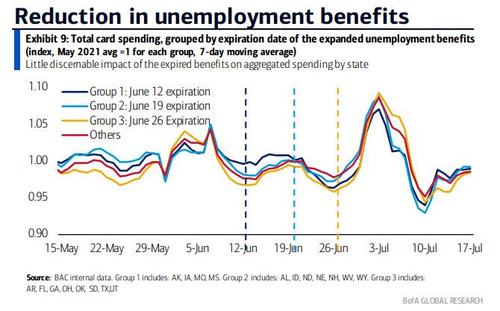Previewing The Next Crisis: Spending Tumbles Among Households Cut Off From Unemployment Benefits
First, the good news. As we first observed one month ago and as we confirmed on Thursday, the debate – inasmuch as one ever existed – is now over: jobless claims, both initial (as Morgan Stanley shows)…
… and continuing (as shown just a few days ago by Goldman)…
… are tumbling in Republican states which have ended emergency covid benefits ahead of their official end in September, while barely budging in Democrat states which hope that government handouts will last forever, just like in all socialist success stories in the history of the world.
The message here: republican states are well on their way to normalizing the most fractured and broken labor market the US has had since World War II, one where there are 9 million job openings and over 12 million people collecting jobless benefits (and refusing to look for a job) thanks to Biden’s generous handouts. Still, the transition back to a normal job market will be a painful one, and one where the jump from full handouts to full employment will be accompanied by a sharp drop off in spending and which may well spark the next (2 month) recession.
Which brings us to the bad news. Total card spending based on the aggregated BAC credit and debit card data shows that as one would expect, states where generous government handouts have ended are seeing a sharp drop in spending, especially among the unemployed.
As Bank of America notes, in the states where benefits were cut, spending was weaker for the cohort receiving UI as compared to those not getting benefits.
For comparison, BofA ran this same exercise for the other states that did not allow for UI expiration: there was a smaller gap between the spending trends of the UI cohort vs. the non-UI recipients (Exhibit 11).
To be sure, nobody is going cold turkey yet: one of the reasons why spending has not fallen off a cliff is that the first monthly payment of the Child Tax Credit was distributed on July 15th, and BofA will be able to quantify its impact in a few days, although it is safe to assume that comforted by the knowledge that Uncle Sam’s benefit will continuing trickling in, even if under a different name, consumers still spent aggressively.
It’s also why despite a growing divergence in spending patterns between household who received unemployment benefits and those that didn’t in states where benefits were cut early, there wasn’t a discernible impact on aggregate spending yet, and overall spending in the states where UI has expired looks similar to the states where UI was not reduced.
This, however, is likely due to the introduction of the abovementioned child credit as well as the accelerated drawdown of the $2.5 trillion in excess savings (of which over $2 trillion was accumulated by the 1%) accumulated during the crisis.
In any case, one thing is clear: once the millions of Democrat US households that are still collecting extended ‘Rona unemployment see their emergency unemployment welfare benefits end in six weeks on September 4, expect a sharp plunge in overall spending, one which may push the current reflationary spike into all-out stagflation because with commodity prices are still in low earth orbit and will be for a far longer time than most expected (due to crushed supply chains which have unwound decades of disinflationary pressures as a result of China having been the source of cheap US goods ever since the 1980s), wages are set to plummet as millions of unemployed workers – no longer living on the government dole – return to the work force and instantly change the labor force equilibrium, giving employees all the leverage.
There is just one thing that could short circuit this coming economic conflagration: another “emergency” which results in another trillion or two in stimmies. Which the government is well aware of, and is milking the delta covid “crisis” for all its worth, preserving the optionality to escalate it to the next lockdown and multi-trillion dollar bailout catalyst once needed
Tyler Durden
Sun, 07/25/2021 – 16:00![]()
Zero Hedge’s mission is to widen the scope of financial, economic and political information available to the professional investing public, to skeptically examine and, where necessary, attack the flaccid institution that financial journalism has become, to liberate oppressed knowledge, to provide analysis uninhibited by political constraint and to facilitate information’s unending quest for freedom. Visit https://www.zerohedge.com




